Impact of Training on Healthcare Professionals During COVID-19 (NHS)
VerifiedAdded on 2022/12/30
|7
|1405
|97
Report
AI Summary
This report investigates the necessity of training and development for healthcare professionals within the National Health Services (NHS) in the UK during the COVID-19 pandemic. The study aims to determine the need for training, assess its impact on healthcare professionals' performance, and identify measures to improve professional capabilities in the face of the pandemic. The research employs a deductive approach with a descriptive research design and quantitative methods, including a survey of 40 NHS employees. The methodology encompasses ethical considerations such as respect for autonomy, privacy, dignity, scientific integrity, social responsibility, and maximizing benefits while minimizing harm. The report highlights the importance of ethical principles, data analysis using thematic analysis, and the creation of frequency tables and graphs. The findings contribute to understanding the critical role of training in enhancing the effectiveness and resilience of healthcare professionals during public health crises.
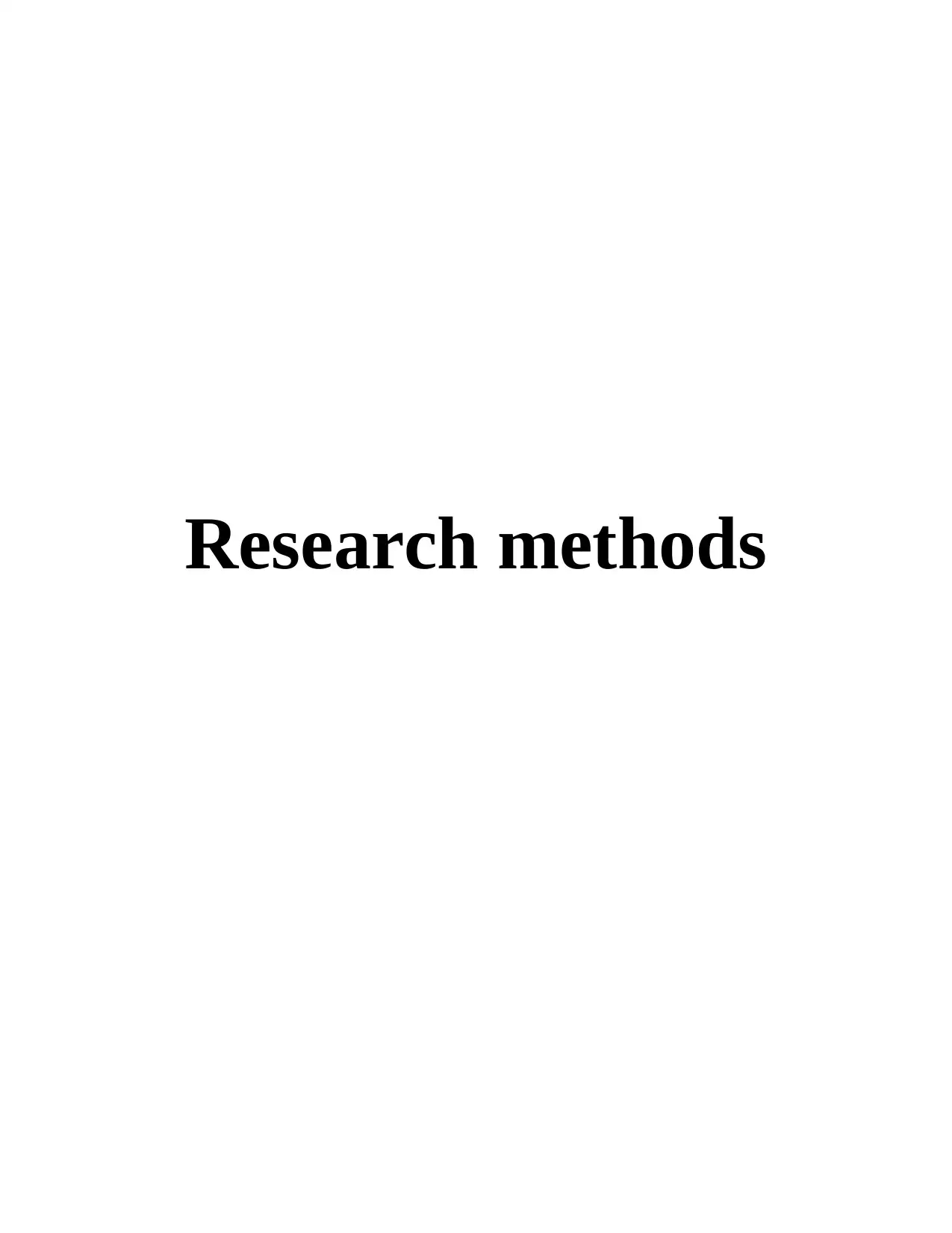
Research methods
Paraphrase This Document
Need a fresh take? Get an instant paraphrase of this document with our AI Paraphraser
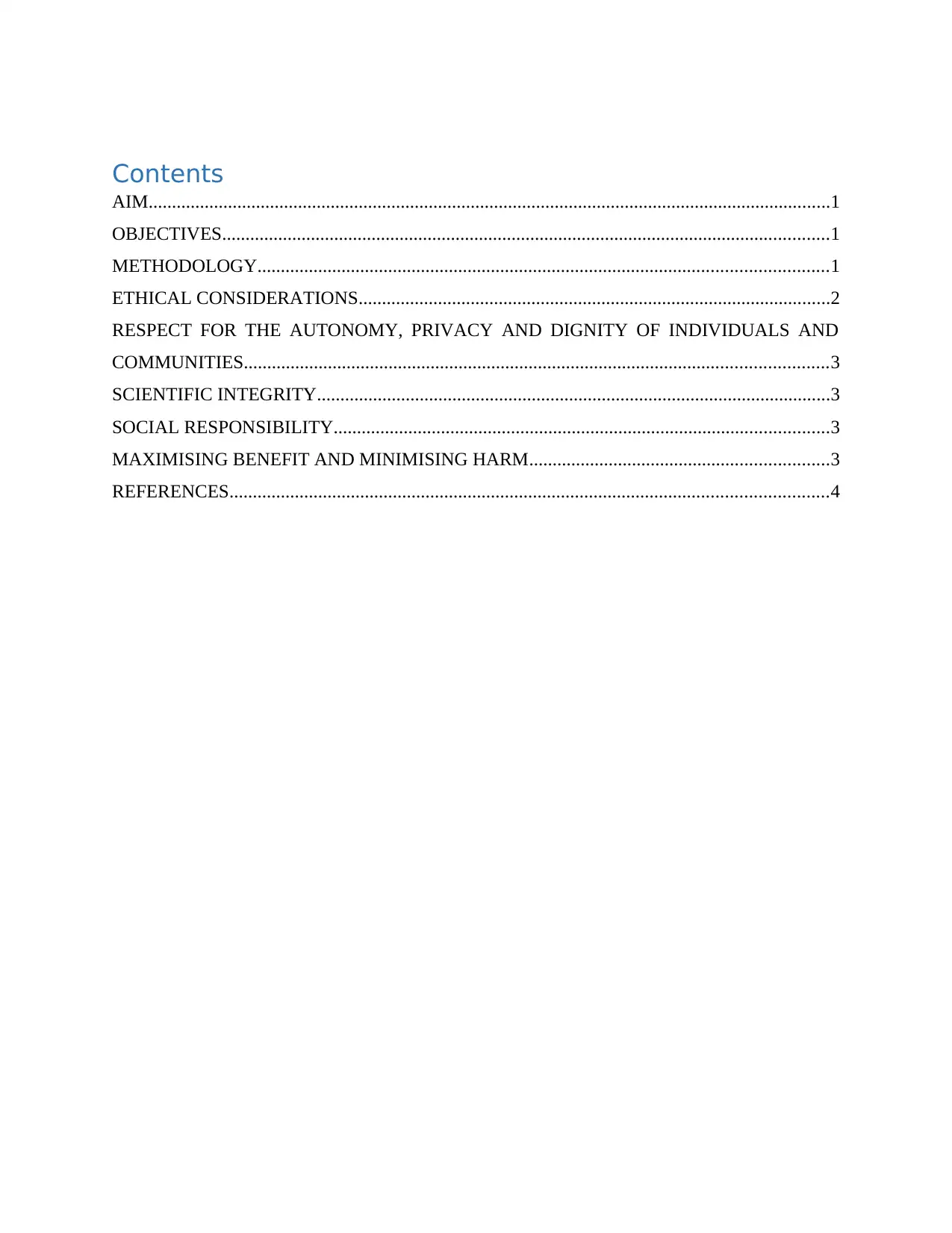
Contents
AIM..................................................................................................................................................1
OBJECTIVES..................................................................................................................................1
METHODOLOGY..........................................................................................................................1
ETHICAL CONSIDERATIONS.....................................................................................................2
RESPECT FOR THE AUTONOMY, PRIVACY AND DIGNITY OF INDIVIDUALS AND
COMMUNITIES.............................................................................................................................3
SCIENTIFIC INTEGRITY..............................................................................................................3
SOCIAL RESPONSIBILITY..........................................................................................................3
MAXIMISING BENEFIT AND MINIMISING HARM................................................................3
REFERENCES................................................................................................................................4
AIM..................................................................................................................................................1
OBJECTIVES..................................................................................................................................1
METHODOLOGY..........................................................................................................................1
ETHICAL CONSIDERATIONS.....................................................................................................2
RESPECT FOR THE AUTONOMY, PRIVACY AND DIGNITY OF INDIVIDUALS AND
COMMUNITIES.............................................................................................................................3
SCIENTIFIC INTEGRITY..............................................................................................................3
SOCIAL RESPONSIBILITY..........................................................................................................3
MAXIMISING BENEFIT AND MINIMISING HARM................................................................3
REFERENCES................................................................................................................................4
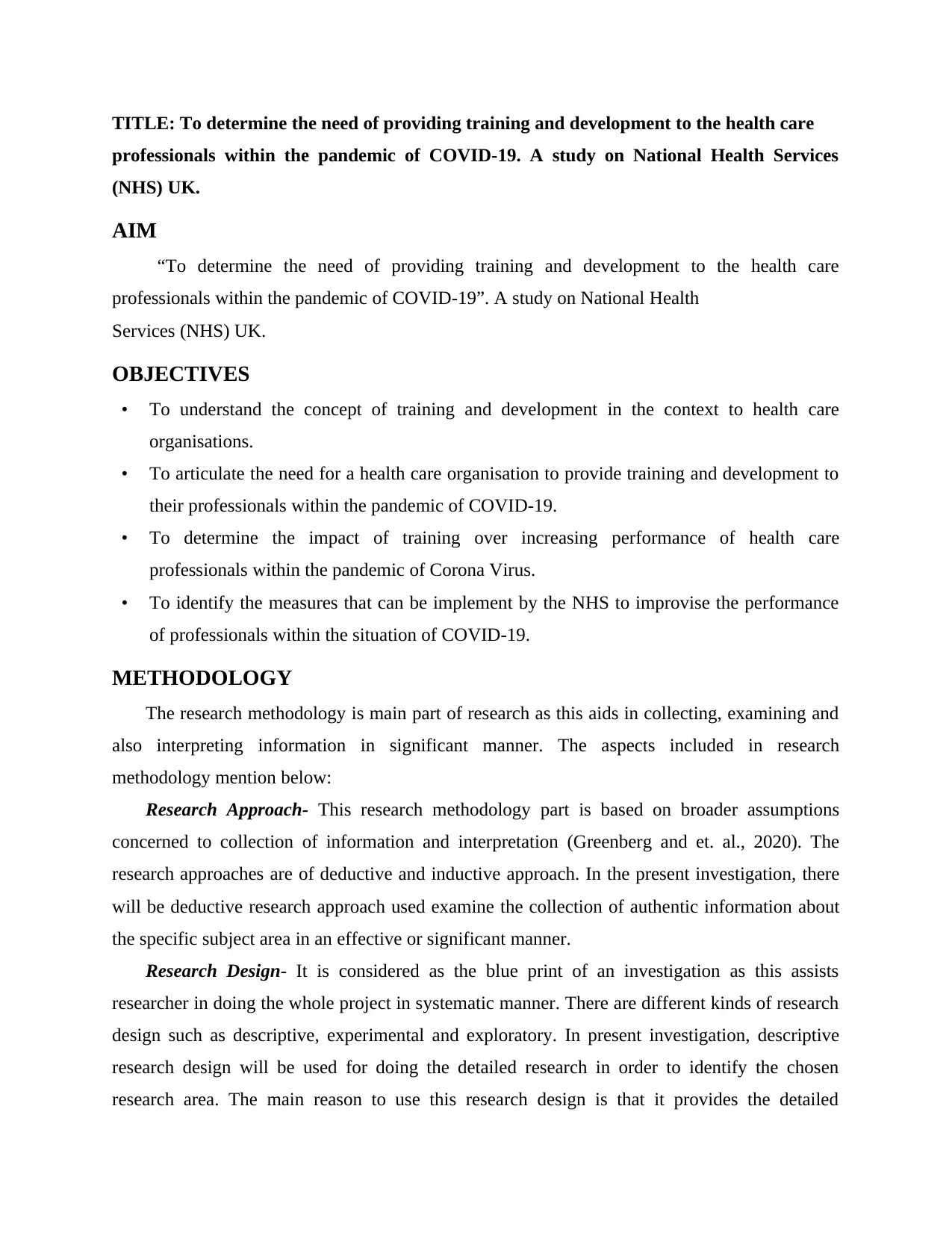
TITLE: To determine the need of providing training and development to the health care
professionals within the pandemic of COVID-19. A study on National Health Services
(NHS) UK.
AIM
“To determine the need of providing training and development to the health care
professionals within the pandemic of COVID-19”. A study on National Health
Services (NHS) UK.
OBJECTIVES
• To understand the concept of training and development in the context to health care
organisations.
• To articulate the need for a health care organisation to provide training and development to
their professionals within the pandemic of COVID-19.
• To determine the impact of training over increasing performance of health care
professionals within the pandemic of Corona Virus.
• To identify the measures that can be implement by the NHS to improvise the performance
of professionals within the situation of COVID-19.
METHODOLOGY
The research methodology is main part of research as this aids in collecting, examining and
also interpreting information in significant manner. The aspects included in research
methodology mention below:
Research Approach- This research methodology part is based on broader assumptions
concerned to collection of information and interpretation (Greenberg and et. al., 2020). The
research approaches are of deductive and inductive approach. In the present investigation, there
will be deductive research approach used examine the collection of authentic information about
the specific subject area in an effective or significant manner.
Research Design- It is considered as the blue print of an investigation as this assists
researcher in doing the whole project in systematic manner. There are different kinds of research
design such as descriptive, experimental and exploratory. In present investigation, descriptive
research design will be used for doing the detailed research in order to identify the chosen
research area. The main reason to use this research design is that it provides the detailed
professionals within the pandemic of COVID-19. A study on National Health Services
(NHS) UK.
AIM
“To determine the need of providing training and development to the health care
professionals within the pandemic of COVID-19”. A study on National Health
Services (NHS) UK.
OBJECTIVES
• To understand the concept of training and development in the context to health care
organisations.
• To articulate the need for a health care organisation to provide training and development to
their professionals within the pandemic of COVID-19.
• To determine the impact of training over increasing performance of health care
professionals within the pandemic of Corona Virus.
• To identify the measures that can be implement by the NHS to improvise the performance
of professionals within the situation of COVID-19.
METHODOLOGY
The research methodology is main part of research as this aids in collecting, examining and
also interpreting information in significant manner. The aspects included in research
methodology mention below:
Research Approach- This research methodology part is based on broader assumptions
concerned to collection of information and interpretation (Greenberg and et. al., 2020). The
research approaches are of deductive and inductive approach. In the present investigation, there
will be deductive research approach used examine the collection of authentic information about
the specific subject area in an effective or significant manner.
Research Design- It is considered as the blue print of an investigation as this assists
researcher in doing the whole project in systematic manner. There are different kinds of research
design such as descriptive, experimental and exploratory. In present investigation, descriptive
research design will be used for doing the detailed research in order to identify the chosen
research area. The main reason to use this research design is that it provides the detailed
⊘ This is a preview!⊘
Do you want full access?
Subscribe today to unlock all pages.

Trusted by 1+ million students worldwide
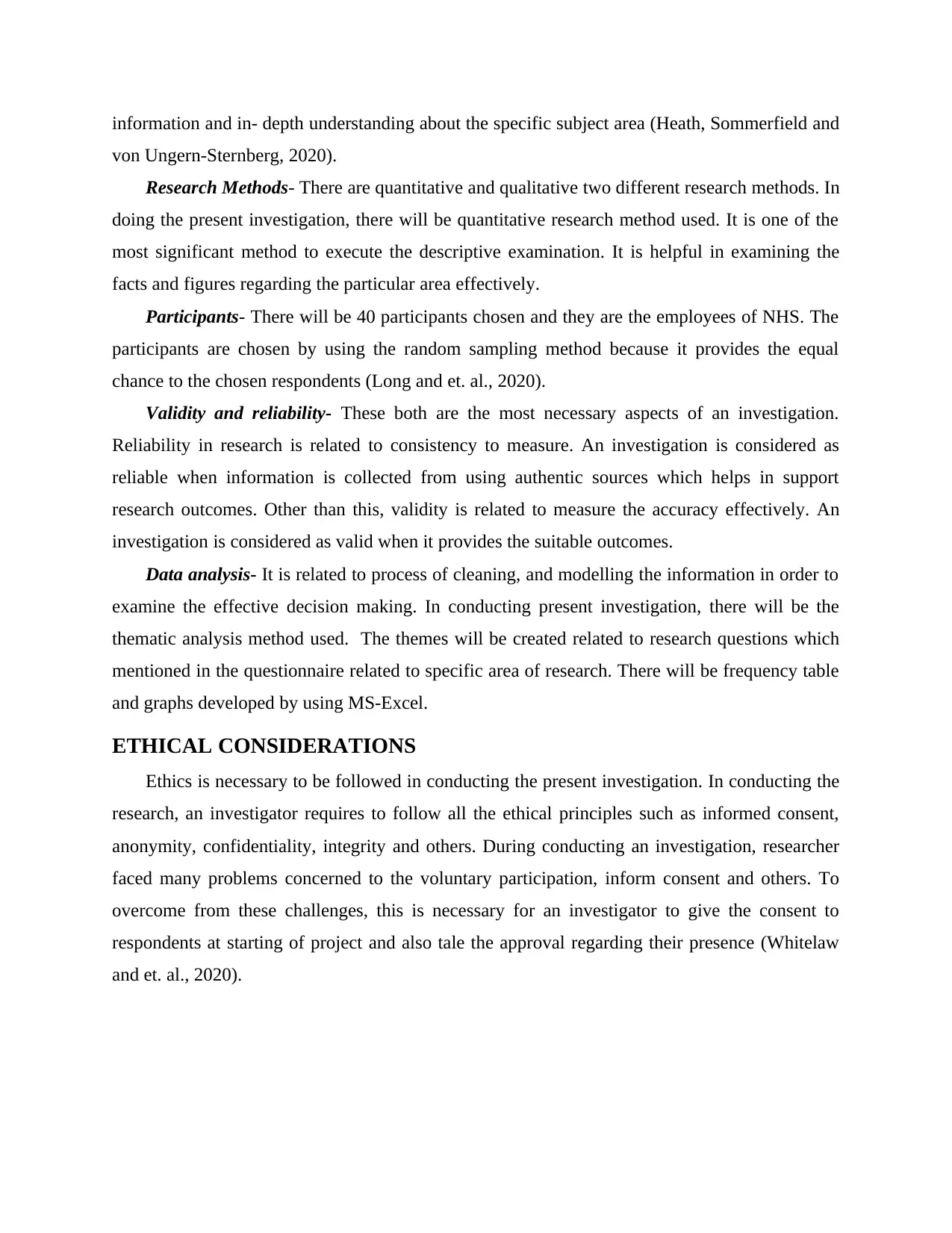
information and in- depth understanding about the specific subject area (Heath, Sommerfield and
von Ungern‐Sternberg, 2020).
Research Methods- There are quantitative and qualitative two different research methods. In
doing the present investigation, there will be quantitative research method used. It is one of the
most significant method to execute the descriptive examination. It is helpful in examining the
facts and figures regarding the particular area effectively.
Participants- There will be 40 participants chosen and they are the employees of NHS. The
participants are chosen by using the random sampling method because it provides the equal
chance to the chosen respondents (Long and et. al., 2020).
Validity and reliability- These both are the most necessary aspects of an investigation.
Reliability in research is related to consistency to measure. An investigation is considered as
reliable when information is collected from using authentic sources which helps in support
research outcomes. Other than this, validity is related to measure the accuracy effectively. An
investigation is considered as valid when it provides the suitable outcomes.
Data analysis- It is related to process of cleaning, and modelling the information in order to
examine the effective decision making. In conducting present investigation, there will be the
thematic analysis method used. The themes will be created related to research questions which
mentioned in the questionnaire related to specific area of research. There will be frequency table
and graphs developed by using MS-Excel.
ETHICAL CONSIDERATIONS
Ethics is necessary to be followed in conducting the present investigation. In conducting the
research, an investigator requires to follow all the ethical principles such as informed consent,
anonymity, confidentiality, integrity and others. During conducting an investigation, researcher
faced many problems concerned to the voluntary participation, inform consent and others. To
overcome from these challenges, this is necessary for an investigator to give the consent to
respondents at starting of project and also tale the approval regarding their presence (Whitelaw
and et. al., 2020).
von Ungern‐Sternberg, 2020).
Research Methods- There are quantitative and qualitative two different research methods. In
doing the present investigation, there will be quantitative research method used. It is one of the
most significant method to execute the descriptive examination. It is helpful in examining the
facts and figures regarding the particular area effectively.
Participants- There will be 40 participants chosen and they are the employees of NHS. The
participants are chosen by using the random sampling method because it provides the equal
chance to the chosen respondents (Long and et. al., 2020).
Validity and reliability- These both are the most necessary aspects of an investigation.
Reliability in research is related to consistency to measure. An investigation is considered as
reliable when information is collected from using authentic sources which helps in support
research outcomes. Other than this, validity is related to measure the accuracy effectively. An
investigation is considered as valid when it provides the suitable outcomes.
Data analysis- It is related to process of cleaning, and modelling the information in order to
examine the effective decision making. In conducting present investigation, there will be the
thematic analysis method used. The themes will be created related to research questions which
mentioned in the questionnaire related to specific area of research. There will be frequency table
and graphs developed by using MS-Excel.
ETHICAL CONSIDERATIONS
Ethics is necessary to be followed in conducting the present investigation. In conducting the
research, an investigator requires to follow all the ethical principles such as informed consent,
anonymity, confidentiality, integrity and others. During conducting an investigation, researcher
faced many problems concerned to the voluntary participation, inform consent and others. To
overcome from these challenges, this is necessary for an investigator to give the consent to
respondents at starting of project and also tale the approval regarding their presence (Whitelaw
and et. al., 2020).
Paraphrase This Document
Need a fresh take? Get an instant paraphrase of this document with our AI Paraphraser
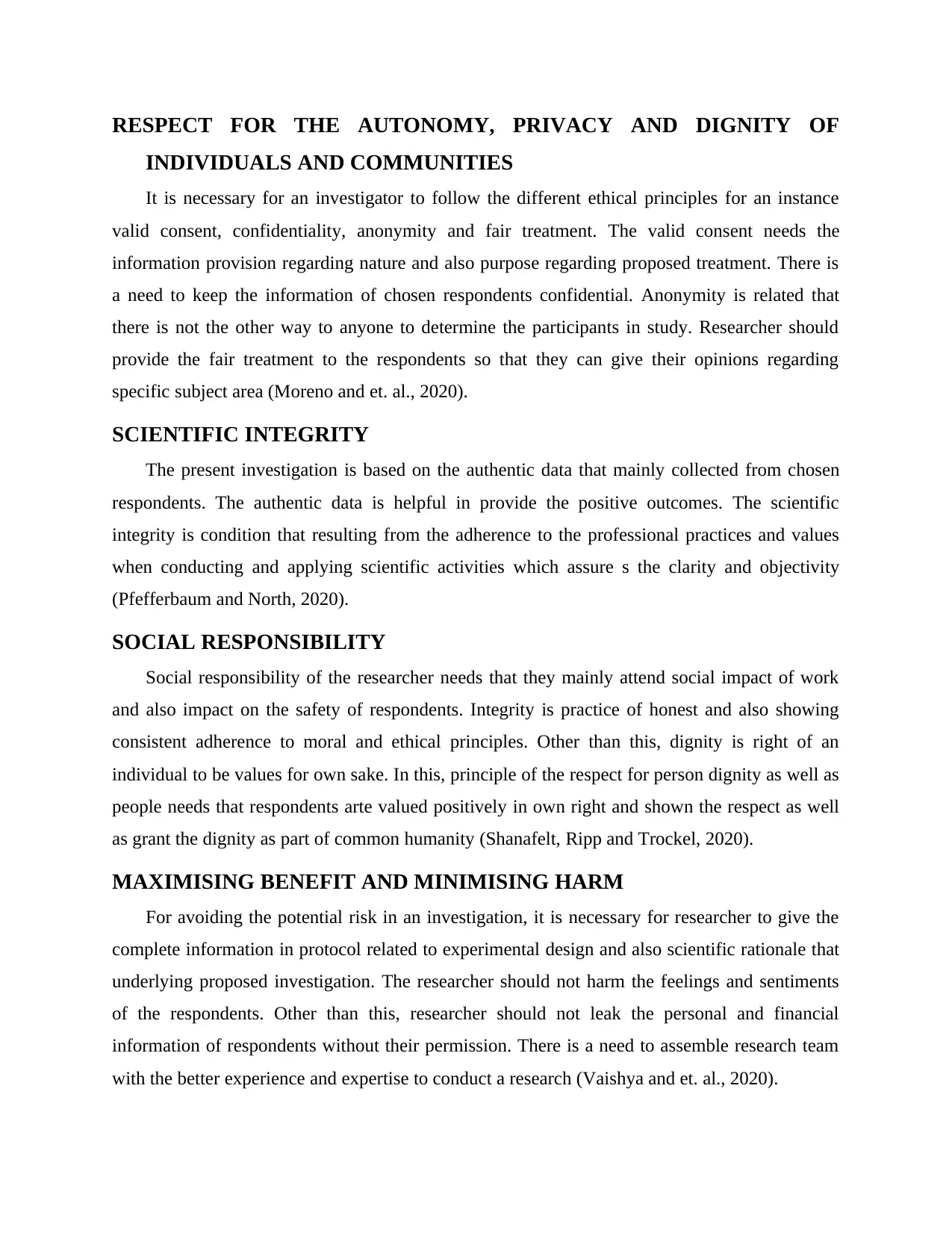
RESPECT FOR THE AUTONOMY, PRIVACY AND DIGNITY OF
INDIVIDUALS AND COMMUNITIES
It is necessary for an investigator to follow the different ethical principles for an instance
valid consent, confidentiality, anonymity and fair treatment. The valid consent needs the
information provision regarding nature and also purpose regarding proposed treatment. There is
a need to keep the information of chosen respondents confidential. Anonymity is related that
there is not the other way to anyone to determine the participants in study. Researcher should
provide the fair treatment to the respondents so that they can give their opinions regarding
specific subject area (Moreno and et. al., 2020).
SCIENTIFIC INTEGRITY
The present investigation is based on the authentic data that mainly collected from chosen
respondents. The authentic data is helpful in provide the positive outcomes. The scientific
integrity is condition that resulting from the adherence to the professional practices and values
when conducting and applying scientific activities which assure s the clarity and objectivity
(Pfefferbaum and North, 2020).
SOCIAL RESPONSIBILITY
Social responsibility of the researcher needs that they mainly attend social impact of work
and also impact on the safety of respondents. Integrity is practice of honest and also showing
consistent adherence to moral and ethical principles. Other than this, dignity is right of an
individual to be values for own sake. In this, principle of the respect for person dignity as well as
people needs that respondents arte valued positively in own right and shown the respect as well
as grant the dignity as part of common humanity (Shanafelt, Ripp and Trockel, 2020).
MAXIMISING BENEFIT AND MINIMISING HARM
For avoiding the potential risk in an investigation, it is necessary for researcher to give the
complete information in protocol related to experimental design and also scientific rationale that
underlying proposed investigation. The researcher should not harm the feelings and sentiments
of the respondents. Other than this, researcher should not leak the personal and financial
information of respondents without their permission. There is a need to assemble research team
with the better experience and expertise to conduct a research (Vaishya and et. al., 2020).
INDIVIDUALS AND COMMUNITIES
It is necessary for an investigator to follow the different ethical principles for an instance
valid consent, confidentiality, anonymity and fair treatment. The valid consent needs the
information provision regarding nature and also purpose regarding proposed treatment. There is
a need to keep the information of chosen respondents confidential. Anonymity is related that
there is not the other way to anyone to determine the participants in study. Researcher should
provide the fair treatment to the respondents so that they can give their opinions regarding
specific subject area (Moreno and et. al., 2020).
SCIENTIFIC INTEGRITY
The present investigation is based on the authentic data that mainly collected from chosen
respondents. The authentic data is helpful in provide the positive outcomes. The scientific
integrity is condition that resulting from the adherence to the professional practices and values
when conducting and applying scientific activities which assure s the clarity and objectivity
(Pfefferbaum and North, 2020).
SOCIAL RESPONSIBILITY
Social responsibility of the researcher needs that they mainly attend social impact of work
and also impact on the safety of respondents. Integrity is practice of honest and also showing
consistent adherence to moral and ethical principles. Other than this, dignity is right of an
individual to be values for own sake. In this, principle of the respect for person dignity as well as
people needs that respondents arte valued positively in own right and shown the respect as well
as grant the dignity as part of common humanity (Shanafelt, Ripp and Trockel, 2020).
MAXIMISING BENEFIT AND MINIMISING HARM
For avoiding the potential risk in an investigation, it is necessary for researcher to give the
complete information in protocol related to experimental design and also scientific rationale that
underlying proposed investigation. The researcher should not harm the feelings and sentiments
of the respondents. Other than this, researcher should not leak the personal and financial
information of respondents without their permission. There is a need to assemble research team
with the better experience and expertise to conduct a research (Vaishya and et. al., 2020).
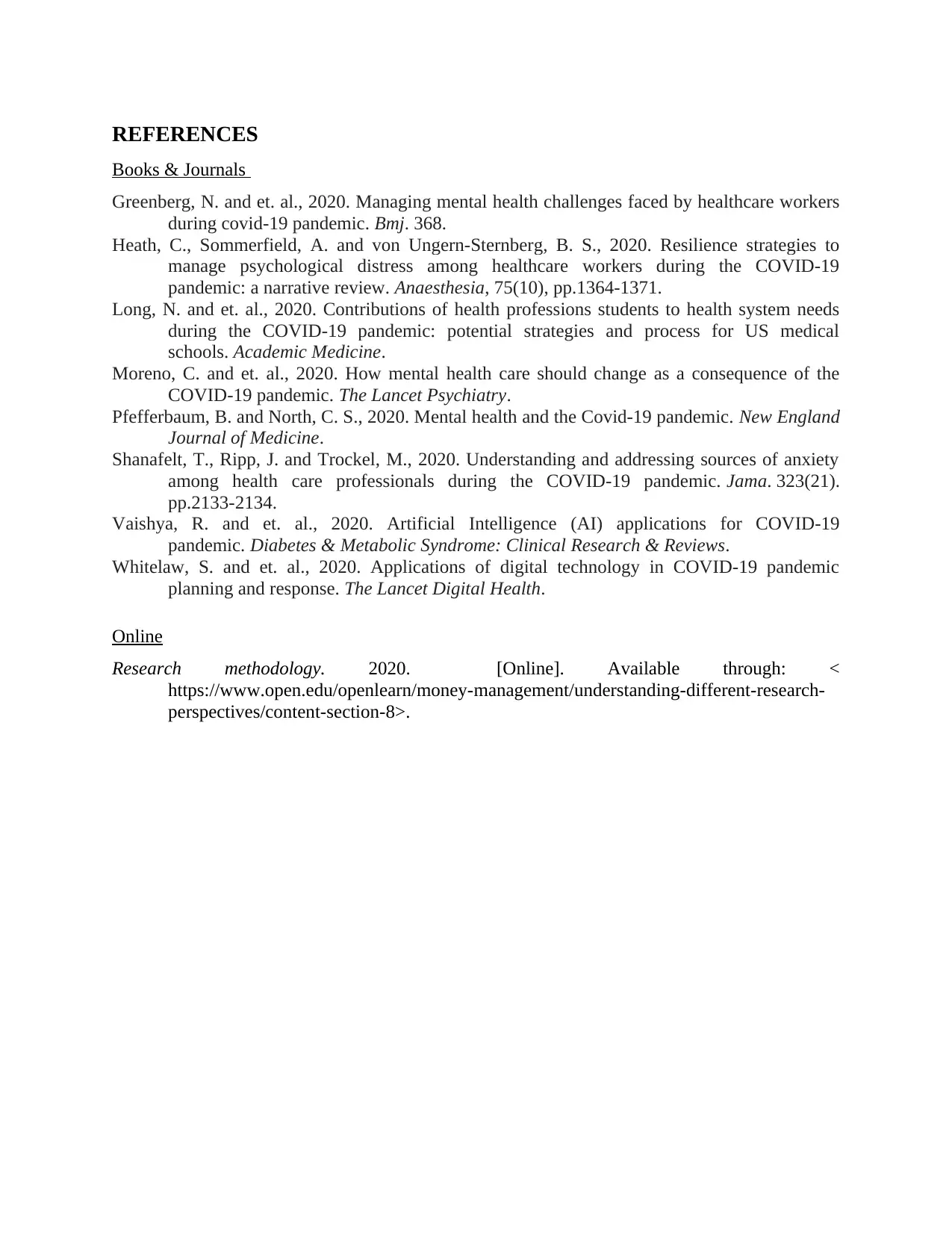
REFERENCES
Books & Journals
Greenberg, N. and et. al., 2020. Managing mental health challenges faced by healthcare workers
during covid-19 pandemic. Bmj. 368.
Heath, C., Sommerfield, A. and von Ungern‐Sternberg, B. S., 2020. Resilience strategies to
manage psychological distress among healthcare workers during the COVID‐19
pandemic: a narrative review. Anaesthesia, 75(10), pp.1364-1371.
Long, N. and et. al., 2020. Contributions of health professions students to health system needs
during the COVID-19 pandemic: potential strategies and process for US medical
schools. Academic Medicine.
Moreno, C. and et. al., 2020. How mental health care should change as a consequence of the
COVID-19 pandemic. The Lancet Psychiatry.
Pfefferbaum, B. and North, C. S., 2020. Mental health and the Covid-19 pandemic. New England
Journal of Medicine.
Shanafelt, T., Ripp, J. and Trockel, M., 2020. Understanding and addressing sources of anxiety
among health care professionals during the COVID-19 pandemic. Jama. 323(21).
pp.2133-2134.
Vaishya, R. and et. al., 2020. Artificial Intelligence (AI) applications for COVID-19
pandemic. Diabetes & Metabolic Syndrome: Clinical Research & Reviews.
Whitelaw, S. and et. al., 2020. Applications of digital technology in COVID-19 pandemic
planning and response. The Lancet Digital Health.
Online
Research methodology. 2020. [Online]. Available through: <
https://www.open.edu/openlearn/money-management/understanding-different-research-
perspectives/content-section-8>.
Books & Journals
Greenberg, N. and et. al., 2020. Managing mental health challenges faced by healthcare workers
during covid-19 pandemic. Bmj. 368.
Heath, C., Sommerfield, A. and von Ungern‐Sternberg, B. S., 2020. Resilience strategies to
manage psychological distress among healthcare workers during the COVID‐19
pandemic: a narrative review. Anaesthesia, 75(10), pp.1364-1371.
Long, N. and et. al., 2020. Contributions of health professions students to health system needs
during the COVID-19 pandemic: potential strategies and process for US medical
schools. Academic Medicine.
Moreno, C. and et. al., 2020. How mental health care should change as a consequence of the
COVID-19 pandemic. The Lancet Psychiatry.
Pfefferbaum, B. and North, C. S., 2020. Mental health and the Covid-19 pandemic. New England
Journal of Medicine.
Shanafelt, T., Ripp, J. and Trockel, M., 2020. Understanding and addressing sources of anxiety
among health care professionals during the COVID-19 pandemic. Jama. 323(21).
pp.2133-2134.
Vaishya, R. and et. al., 2020. Artificial Intelligence (AI) applications for COVID-19
pandemic. Diabetes & Metabolic Syndrome: Clinical Research & Reviews.
Whitelaw, S. and et. al., 2020. Applications of digital technology in COVID-19 pandemic
planning and response. The Lancet Digital Health.
Online
Research methodology. 2020. [Online]. Available through: <
https://www.open.edu/openlearn/money-management/understanding-different-research-
perspectives/content-section-8>.
⊘ This is a preview!⊘
Do you want full access?
Subscribe today to unlock all pages.

Trusted by 1+ million students worldwide

5
1 out of 7
Related Documents
Your All-in-One AI-Powered Toolkit for Academic Success.
+13062052269
info@desklib.com
Available 24*7 on WhatsApp / Email
![[object Object]](/_next/static/media/star-bottom.7253800d.svg)
Unlock your academic potential
Copyright © 2020–2026 A2Z Services. All Rights Reserved. Developed and managed by ZUCOL.





